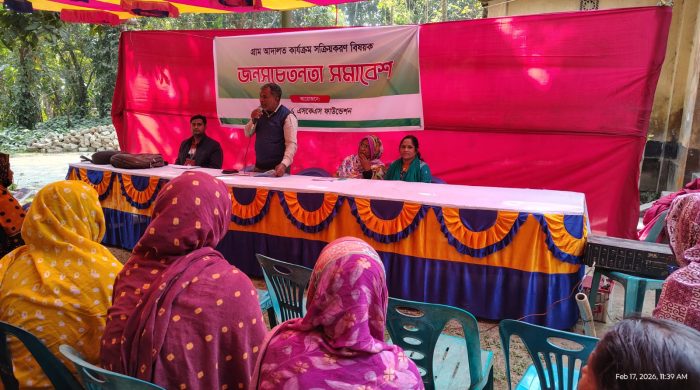“Development of administrative adjudication system in Bangladesh”

Administrative adjudication is a name give to the administrative exercise of judicial functions. It is a name given to the various ways of deciding disputes outside the ordinary courts. Administrative adjudication is constitutional, though it is a negation of the principle of separation of powers. Administrative adjudication is the participation or involvement of the executive arm of government (administrative agencies) in judicial function. Through the instrumentality of administrative adjudication, administrative agencies can pass authoritative and appealable decisions.
Administrative adjudication is usually performed through the machinery of “Tribunals” and “Inquiries”. Modern public administration has taken a leaf not only from the legislature’s book but also from that of the judiciary. Administrative Adjudication is the latest addition to the administrative techniques.
Administrative Adjudication means the determination of questions of a judicial or quasi-judicial nature by an administrative department or agency. Like a regular court, administrative bodies hear the parties, sift evidence, and pronounce a decision in cases where legal rights or duties are involved. In the words of Prof White, “…administrative adjudication means the investigation and settling of a dispute involving a private party on the basis of a law and fact by an administrative agency.” Blachly and Oatman describe administrative tribunals or Admin¬istrative Courts as, “authorities outside the ordinary court system which interpret and apply the laws when acts of public administration are attacked in formal suits or by other established methods.”
It is no doubt true that the rapid growth administrative tribunals is a special features of the 20th century. After the first and second world war , several tribunals were created under various welfare beneficent legislations. Today administrative tribunals deal with and decide range of disputes between individuals and individuals as well as between subjects and their governments.
The history shows that man has always appealed to something higher than that which is his own creation. In jurisprudence, Romans call it ‘jus naturale’, Hobbes, Lock and Rousseau call it ‘social contract’, or ‘natural law’ and the modern man calls it Rule of Law.
The term Rule of Law derived from French phase ‘la principe de legalite’ which means the principle of legality. It refers to a government based on principles of law and not of man. Edward Coke is said to be the originator of this concept. Dicey’s concept of Rule of Law contains three principles:–Absence of discretionary power in the hands of government officials; Person should not be punished except for the breach of law and the rights must flow from customs and traditions of people.
The system of administrative legislation and adjudication has existed in India from a very long time. The Britishers came to India for trade so the primary object of British administration was to maximise profit. As the Britishers gained control over India the efficiency of administration became the basic necessity to fulfil its basic purpose. The executive at that time had overriding powers in the matters of justice.
The establishment of Supreme Court in Calcutta had inaugurated an era of independent judicial administration but it came to an end with the passage of the Act of Settlement, 1781. After the Battle of Plassy 1757 a centralised administrative system was formed to make laws. Thereafter many regulations were passed to take care of administrative justice system, one among them is Cornwallis Code, 1793. The other one is Section 108 of Regulation Act 1822 which required administrative agencies to record facts, evidence and decision. The court had power to control administrative actions but it payed great respect and attention to the administrative decision.
It has been observed that we are living in a changed world, a world of new moral concepts but of outworn legal institutions. It is evident that the American legal system has slowly been adapting itself to meet great changes. The developments of the past few decades have resulted mainly in the establishment of a system of administrative agencies, tribunals and law. Even in the 19th century administrative law was developing in the United States and today it is in many phases of equal or greater importance than the judicial system developed through the common law. The causes of this new and divergent arm of the law originated in the fundamental changes which occurred throughout the past century in the social and industrial life of this country, changes momentous enough to effect, in some spheres of social and industrial activity, entirely original and unprecedented methods of dealing with the problems presented therein.
According to the dicey’s theory of the rule of law, ordinary law of the land must be administered by ordinary law courts. He was opposed to the establishment of administrative tribunals. According to the classical theory and doctrine of separation of powers, the function of deciding disputes between the parties belonged to the ordinary law court. But the governmental functions have increased and ordinary courts of law are not in a position to the situation solve the problems arising in the new changed society.
So, now we can elaborate the reasons for which the administrative tribunals are established: The system of administrative tribunals has positively contributed to the preservation of ordinary judicial sytem; Increasing the governmental functions and activities overloaded the courts with cases that they were unable to deal effectively; The traditional judicial system proved inadequate to decide and settle all disputes requiring solutions because of its slow, costly, complex and formalistics; The administrative authorities can avoid technicalities. They take a functional rather than a theoretical and legalistic; Administrative authorities can take effective steps for enforcement of the aforesaid preventive measures e.g suspension, revocation or cancellation of licenses, destruction of contaminated articles etc. Administrative authorities provide the decision by exercise of wide discretion conferred on them or on the basis of the departmental policy and other relevant factors. Sometimes, the disputed questions are technical in nature and the traditional judiciary can not be expected to appreciate and decide them.
The advantages of administrative adjudication are summarily highlighted for various reasons. administrative adjudication is that it facilitates the use of expert knowledge and skill and so diligence, care, and professionalism are usually brought to bear in such adjudicatory process. This is unlike the position in the normal court system where a single judge is a jack of all trade, and thus may be master of none. Administrative adjudication uses experts in that field where the issue bothers on; Cases which are handled by administration tribunals are more expeditiously determined compared with those handled by the courts. Judicial proceedings can be not only time consuming; but also very demanding in terms of cost, so it is not cheap to litigate or for a person to ventilate his grievances through the instrumentality of the ordinary judicial process. (Examples of necessary expense include paying a lawyer, filling fees and sundry fees). However, all these can be done away with if we are talking about administrative adjudicatory process because the length of time to spend there is short; accordingly the litigant will not pay much transport fee or appearance fee. Administrative adjudicatory process is usually informal and not characterized by the rigid rules of evidence and procedure or precedence, which applies in a normal judicial process. This practice and procedure is usually responsible for the inbuilt delay in the court process. From informality comes a situation where proceedings before administrative tribunals are flexible. No rigidity, no hard and fast rules to contend with. The proceedings are usually amenable to changes to suit a particular convenience. Thus, informality promotes flexibility. Note that the practice and procedure of administrative tribunals are not rigid, but are generally amenable to changes.
A Government Servant during the British rule in India held the office during the pleasure of the Crown. It was for the first time in 1919 certain constitutional protections were provided for the Government servants by the insertion of section 96B in the Government of India Act, 1915. This section was incorporated in the Government of India Act, 1935 and in the Pakistan Constitution.
During the adoption of Bangladesh Constitution, 1972, the framers of the Constitution included the provision in Article 117.Article 117(1) of Bangladesh Constitution, 1972 empowers the Parliament to establish one or more Administrative Tribunals against whose decisions no writ will lie in view of the provision of Article 102(5). In 1982 when Administrative Tribunal Act, 1980 came into foce, only Govt. officials could go to administrative tribunal and no other else. But later by administrative tribunal ordinance, 1984 statutory Public Authority service holder also can go to administrative tribunal.
RAIHATUL GIR KOSBA
Advocate, District & Sessions Judge Court, Cox’s Bazar.
Lecturer, Department Of Law, Cox’s Bazar International University.





























